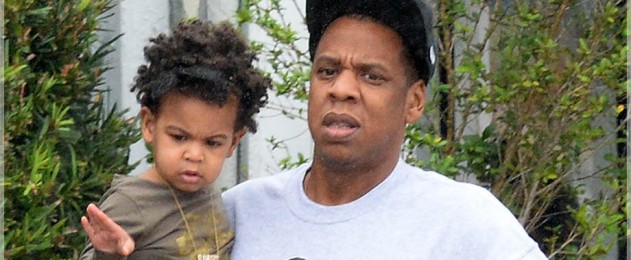Black women are constantly scrutinized for their parenting. And attacking Blue Ivy’s hair is a way of attacking Beyonce.
A topic of conversation I never found engaging was “natural hair vs. permed hair.” Seriously, who has the audacity to tell someone their hair is wrong?
But the main reason I intentionally don’t engage in this discourse is because I’m a man with a low-cut fade. As such, telling a woman she should have permed rather than natural hair, or vice-versa, reeks of condescension and privilege.
That said, I never run away from anything related to Beyonce, “The Greatest Living Entertainer,” as coined by her husband Jay-Z this past Sunday at the VMAs after a stellar performance upon her receiving the “Michael Jackson Video Vanguard Award.”
If life has taught us anything, it is to not speak negatively about Beyonce, her fans, or her family. No, this article is not about the power of the Beygency, or about why Beyonce is one of the best entertainers to walk the face of the Earth. And this article is certainly not about whether Beyonce is a feminist (hint: she is). Instead, it’s about internalized hatred and the overly-comfortable nature of society policing her 2-year-old daughter Blue Ivy’s hair.
Blue Ivy has been under heightened scrutiny since conception, including the ridiculous debate over whether or not Beyonce actually carried Blue Ivy in her own womb. So, it comes as no surprise, unfortunately, that the scrutiny has continued.
Topic of conversation du jour (again): her hair.
What is wrong with Blue Ivy’s hair, you ask yourself? The answer is absolutely nothing. But the recent news would have you thinking otherwise.
On Monday, when BET’s show “106 & Park” speculated on the “Top Six Things Blue Ivy Thought at the VMAs,” as part of a script, Karreuche Tran stated, “I really did wake up like this—because my parents never comb my hair.”
Later, Stephen Hill, BET Executive Vice-President of Music Programming and Talent, apologized to Beyonce and Jay-Z over the poor joke.
Ever since pictures emerged of Blue Ivy’s hair, word spread about how it was “unkempt,” “nappy,” and “knotted.” Sadly, these words were never followed up with individuals admitting their internalized anti-blackness.
Remember the petition to get Blue Ivy to comb her hair?
“As a woman who understands the importance of hair care, it’s disturbing to watch a child suffering from the lack of hair moisture,” the petition reads. “The parents of Blue Ivy, Sean Carter A.K.A. Jay-Z and Beyonce, have failed at numerous attempts of doing Blue Ivy’s hair. This matter has escalated to the child developing matted dreads and lint balls. Please let’s get the word out to properly care for Blue Ivy’s hair.”
Although the petition’s creator claimed to have been joking, the 5,639 signatures attached agreed with her alleged joke.
Unless you are Blue Ivy’s hairstylist—assuming a baby should ever have one—perhaps you should consider being silent about how she is “suffering from a lack of hair moisture.” Furthermore, Blue Ivy is a baby, and no matter how much you comb, perm, burn, or put it in ponytails, a baby’s hair will be disheveled.
In “Blue Ivy’s Hair is Perfect and You Should Shut Up About It,” Kara Brown notes:
“Blue Ivy has an adorable little afro. Her hair has not been styled into perfectly separated ringlets or slicked back or laid down in some way. She wears her hair the way it grows out of her head and that is what people are so bothered by. All of the issues of racism and colorism aside, at the end of the day, if you feel the need to comment on the state of Blue Ivy’s hair, know that you are a grown adult making fun of a child. Some will try to look like less of a jackass by insisting that they’re really criticizing Jay-Z and Beyonce, since Blue Ivy has no real control over what is done to her hair.”
The sad truth is that society will consider hair “bad” if someone is boldly wearing it the way it comes from their scalp. And frankly, many people would have hair like Blue Ivy’s if it were devoid of chemicals, products, and anything else to make it more “manageable.” And you know what? If you did, nothing would be wrong with your hair, just as nothing is wrong with Blue Ivy’s hair.
It is important to note that many of the comments I’ve heard related to Blue Ivy’s hair and the fact that it isn’t “done” are made from my fellow black brothers and sisters. No, it isn’t because they hate Blue Ivy, but rather, because they hate themselves—I can only assume—and Blue Ivy becomes the unfortunate target.
Attacking black women for their motherhood and their hair is nothing new. Take, for example, Jada Pinkett-Smith and Willow Smith. Jada was ridiculed for allowing her daughter to shave her hair, dye her hair, and even whipping her hair back-and-forth. However, Willow’s father, Will Smith, never came under attack. The same is true for Beyonce.
Attacking Willow Smith’s various hairstyles was an indirect way of attacking Jada’s parenting, and similarly, attacking Blue Ivy’s hair is a way of attacking Beyonce’s parenting. Both are ways our internalized hatred continues to condemn black women and their motherhood.
We need to stop forcing this internalized anti-blackness onto others—especially a 2-year-old child. We have many problems in the world, and the texture, styling, and length of Blue Ivy’s hair is not one of them.
Preston Mitchum is a regular contributor to Role Reboot. He is a civil rights advocate and legal writing professor in Washington, DC. Preston has written for The Atlantic, theGrio, Huffington Post, Ebony.com, and Think Progress. Follow him on Twitter here.
Related Links:

